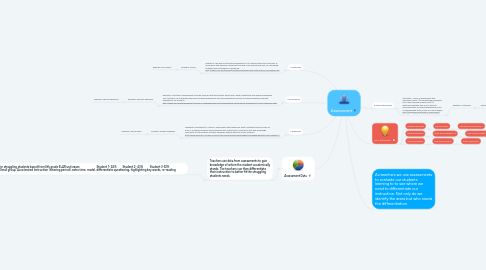Assessment
par Meagan Cook


1. 1.Summative
1.1. Definition: The goal of summative assessment is to measure the level of success or proficiency that has been obtained at the end of an instructional unit, by comparing it against some standard or benchmark. http://www.cmu.edu/teaching/assessment/howto/basics/formative-summative.html
1.1.1. Example: STAAR
1.1.1.1. Example: EOC exams
2. 2.Performance
2.1. Definition: This type of assessment provides teachers with information about how a child understands and applies knowledge. Also, teachers can integrate performance-based assessments into the instructional process to provide additional learning experiences for students. http://www.ascd.org/publications/classroom-leadership/feb2000/Implementing-Performance-Assessment-in-the-Classroom.aspx
2.1.1. Example: checklist approach
2.1.1.1. Example: memory approach
3. 3.Diagnostic
3.1. Diagnostic assessment is a type of assessment which examines what a student knows and can do prior to a learning program being implemented. Assessment of students' skills and knowledge upon entry to the program provides a baseline against which to assess progress. http://www.education.vic.gov.au/school/principals/participation/pages/reengagediagnostic.aspx?Redirect=1
3.1.1. Example: Graphic organizer
3.1.1.1. Example: Journal Entry
4. Assessment Data
4.1. Teachers use data from assessments to gain knowledge of where the student academically stands. The teachers can then differentiate their instruction to better fit the struggling students needs.
4.1.1. Strategies for struggling students based from 6th grade ELAR unit exam: Student 1- 24% Student 2- 43% Student 3-52% Strategies: Small group, Accelerated Instruction (tutoring period), extra time, model, differentiate questioning, highlighting key words, re-reading
5. 5.Interim/Benchmark
5.1. Definition: a form of assessment that educators use to (1) evaluate where students are in their learning progress and (2) determine whether they are on track to performing well on future assessments, such as standardized tests or end-of-course exams. http://edglossary.org/interim-assessment/
5.1.1. Example: Unit Exams
5.1.1.1. Example: istation testing
6. H.O.T. QUESTIONS
6.1. Opening Questions
6.1.1. Can you recall?
6.1.1.1. How would you describe...?
6.2. Guiding Questions
6.2.1. What would happen if...?
6.2.1.1. How could you apply..?
6.3. Closing Questions
6.3.1. How can you use it?
6.3.1.1. What is the result?

